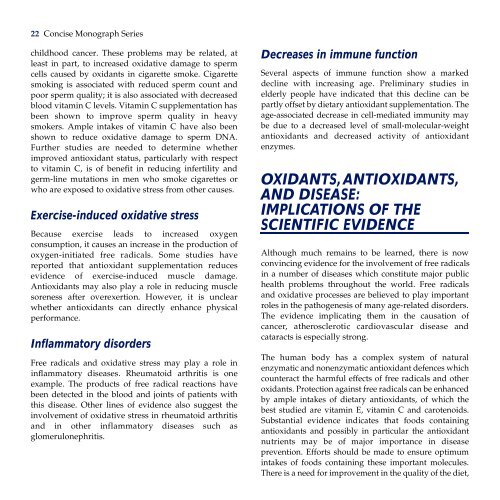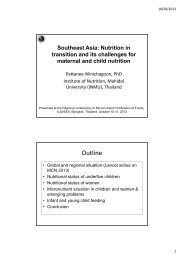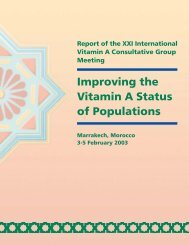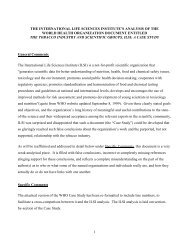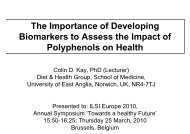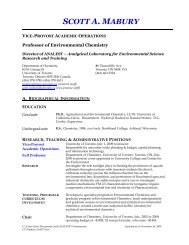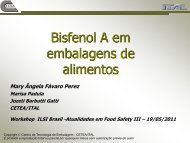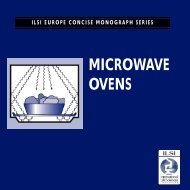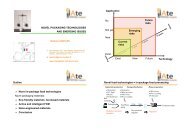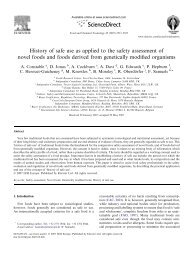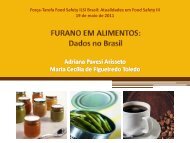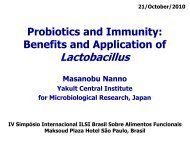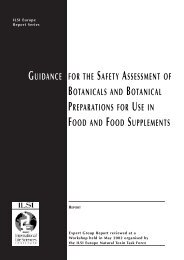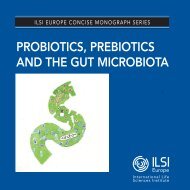Oxidants, Antioxidants and Disease Prevention - Aara-Super food
Oxidants, Antioxidants and Disease Prevention - Aara-Super food
Oxidants, Antioxidants and Disease Prevention - Aara-Super food
You also want an ePaper? Increase the reach of your titles
YUMPU automatically turns print PDFs into web optimized ePapers that Google loves.
22 Concise Monograph Series<br />
childhood cancer. These problems may be related, at<br />
least in part, to increased oxidative damage to sperm<br />
cells caused by oxidants in cigarette smoke. Cigarette<br />
smoking is associated with reduced sperm count <strong>and</strong><br />
poor sperm quality; it is also associated with decreased<br />
blood vitamin C levels. Vitamin C supplementation has<br />
been shown to improve sperm quality in heavy<br />
smokers. Ample intakes of vitamin C have also been<br />
shown to reduce oxidative damage to sperm DNA.<br />
Further studies are needed to determine whether<br />
improved antioxidant status, particularly with respect<br />
to vitamin C, is of benefit in reducing infertility <strong>and</strong><br />
germ-line mutations in men who smoke cigarettes or<br />
who are exposed to oxidative stress from other causes.<br />
Exercise-induced oxidative stress<br />
Because exercise leads to increased oxygen<br />
consumption, it causes an increase in the production of<br />
oxygen-initiated free radicals. Some studies have<br />
reported that antioxidant supplementation re d u c e s<br />
evidence of exercise-induced muscle damage.<br />
<strong>Antioxidants</strong> may also play a role in reducing muscle<br />
s o reness after overexertion. However, it is unclear<br />
whether antioxidants can directly enhance physical<br />
performance.<br />
Inflammatory disorders<br />
Free radicals <strong>and</strong> oxidative stress may play a role in<br />
inflammatory diseases. Rheumatoid arthritis is one<br />
example. The products of free radical reactions have<br />
been detected in the blood <strong>and</strong> joints of patients with<br />
this disease. Other lines of evidence also suggest the<br />
involvement of oxidative stress in rheumatoid arthritis<br />
<strong>and</strong> in other inflammatory diseases such as<br />
glomerulonephritis.<br />
Decreases in immune function<br />
Several aspects of immune function show a marked<br />
decline with increasing age. Preliminary studies in<br />
elderly people have indicated that this decline can be<br />
partly offset by dietary antioxidant supplementation. The<br />
age-associated decrease in cell-mediated immunity may<br />
be due to a decreased level of small-molecular-weight<br />
antioxidants <strong>and</strong> decreased activity of antioxidant<br />
enzymes.<br />
OXIDANTS, ANTIOXIDANTS,<br />
AND DISEASE:<br />
IMPLICATIONS OF THE<br />
SCIENTIFIC EVIDENCE<br />
Although much remains to be learned, there is now<br />
convincing evidence for the involvement of free radicals<br />
in a number of diseases which constitute major public<br />
health problems throughout the world. Free radicals<br />
<strong>and</strong> oxidative processes are believed to play important<br />
roles in the pathogenesis of many age-related disorders.<br />
The evidence implicating them in the causation of<br />
c a n c e r, athero s c l e rotic cardiovascular disease <strong>and</strong><br />
cataracts is especially strong.<br />
The human body has a complex system of natural<br />
enzymatic <strong>and</strong> nonenzymatic antioxidant defences which<br />
counteract the harmful effects of free radicals <strong>and</strong> other<br />
oxidants. Protection against free radicals can be enhanced<br />
by ample intakes of dietary antioxidants, of which the<br />
best studied are vitamin E, vitamin C <strong>and</strong> carotenoids.<br />
Substantial evidence indicates that <strong>food</strong>s containing<br />
antioxidants <strong>and</strong> possibly in particular the antioxidant<br />
nutrients may be of major importance in disease<br />
prevention. Efforts should be made to ensure optimum<br />
intakes of <strong>food</strong>s containing these important molecules.<br />
There is a need for improvement in the quality of the diet,


